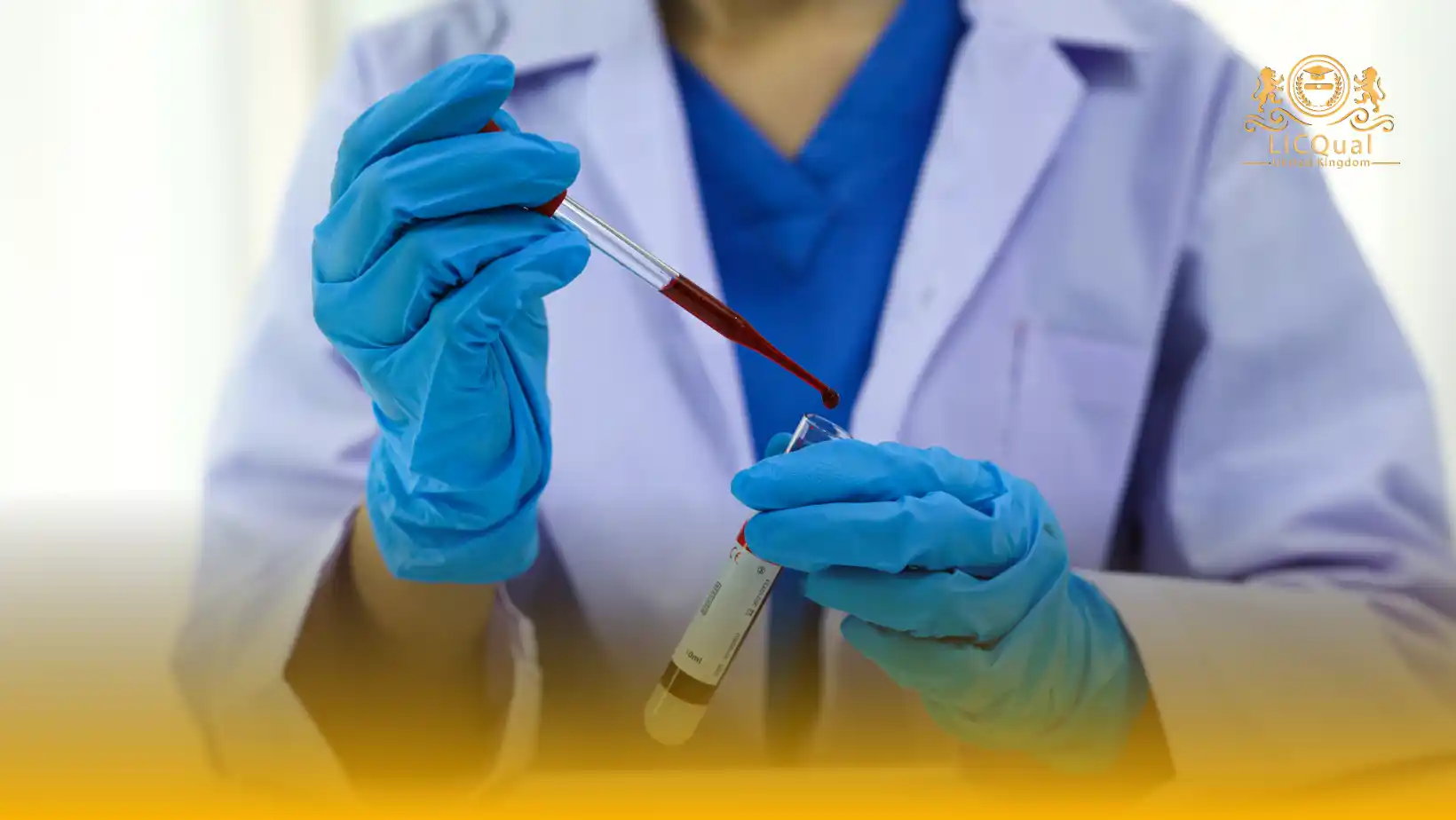The LICQual Level 6 Diploma in Infectious Diseases Pharmacy (D Infectious Diseases Pharmacy) is a specialized qualification designed for pharmacy and healthcare professionals who wish to advance their careers, expand their expertise, and enhance their Continuing Professional Development (CPD). This comprehensive programme equips learners with the advanced knowledge and practical skills necessary to manage pharmaceutical care for patients with infectious diseases, including complex and resistant infections.
Learners undertaking this diploma will explore a wide range of topics including antimicrobial pharmacology, infection control, antimicrobial stewardship, patient-centred care, and the monitoring of therapeutic outcomes. The course emphasises evidence-based practice, critical thinking, and clinical decision-making, enabling learners to optimise treatment outcomes and contribute effectively to public health initiatives.
Centres delivering the LICQual Level 6 Diploma in Infectious Diseases Pharmacy are required to maintain the highest standards of training. This includes employing competent and qualified staff, providing access to up-to-date learning materials and resources, and creating a supportive environment that fosters learner success. By adhering to these standards, centres ensure learners gain both theoretical knowledge and practical skills essential for professional excellence in infectious diseases pharmacy.
Whether you are a practicing pharmacist, a clinical healthcare professional, or an individual committed to specializing in infectious diseases pharmacy, this diploma offers a recognized pathway to advanced professional development. Enrolment equips learners with the tools, knowledge, and confidence to make a meaningful impact in patient care and infection management while progressing their careers in this highly specialized and rewarding field.
Course Overview
Qualification Title
LICQual Level 6 Diploma in Infectious Diseases Pharmacy (D Infectious Diseases Pharmacy)
Total Units
6
Total Credits
120
GLH
480
Qualification #
LICQ2201201
Qualification Specification
To enroll in the LICQual Level 6 Diploma in Infectious Diseases Pharmacy (D Infectious Diseases Pharmacy) , applicants must meet the following criteria:
|
Qualification# |
Unit Title |
Credits |
GLH |
|---|---|---|---|
|
LICQ2201201-1 |
Advanced Antimicrobial Pharmacology |
20 |
80 |
|
LICQ2201201-2 |
Infection Assessment and Treatment Management |
20 |
80 |
|
LICQ2201201-3 |
Antimicrobial Stewardship and Patient-Centred Care |
20 |
80 |
|
LICQ2201201-4 |
Ethical, Legal, and Professional Standards in Infectious Diseases Pharmacy |
20 |
80 |
|
LICQ2201201-5 |
Research and Evidence-Based Practice in Infectious Diseases Pharmacy |
20 |
80 |
|
LICQ2201201-6 |
Leadership and Quality Assurance in Infectious Disease Services |
20 |
80 |
By the end of this course, learners will be able to:
Unit 1: Advanced Antimicrobial Pharmacology
Learners will be able to:
- Analyse the pharmacokinetics and pharmacodynamics of antibiotics, antivirals, antifungals, and antiparasitic agents.
- Evaluate mechanisms of action, efficacy, and safety profiles of antimicrobial agents.
- Identify potential drug-drug and drug-disease interactions in infectious disease management.
- Apply principles of combination therapy and targeted antimicrobial treatment.
- Critically appraise emerging research on antimicrobial resistance and novel therapies.
Unit 2: Infection Assessment and Treatment Management
Learners will be able to:
- Conduct comprehensive clinical assessments of patients with infectious diseases.
- Develop evidence-based treatment plans tailored to individual patient needs.
- Monitor patient responses to therapy and adjust treatment strategies accordingly.
- Apply clinical guidelines to optimise infection management outcomes.
- Integrate multidisciplinary approaches in the care of patients with infectious diseases.
Unit 3: Antimicrobial Stewardship and Patient-Centred Care
Learners will be able to:
- Implement antimicrobial stewardship strategies to promote responsible use of antimicrobials.
- Educate patients on adherence, infection prevention, and safe medication practices.
- Apply patient-centred care approaches to improve therapeutic outcomes.
- Address psychosocial, behavioural, and cultural factors affecting patient care.
- Promote holistic care for individuals with infectious diseases.
Unit 4: Ethical, Legal, and Professional Standards in Infectious Diseases Pharmacy
Learners will be able to:
- Apply ethical principles in decision-making for infectious disease management.
- Demonstrate understanding of legal and regulatory frameworks governing pharmacy practice.
- Maintain professional standards, confidentiality, and informed consent.
- Identify and manage ethical dilemmas in infectious disease care.
- Evaluate organisational policies to ensure compliance with professional and legal standards.
Unit 5: Research and Evidence-Based Practice in Infectious Diseases Pharmacy
Learners will be able to:
- Critically appraise research literature and clinical studies in infectious diseases.
- Apply evidence-based guidelines to inform clinical decision-making.
- Design and conduct audits or small-scale research projects in pharmacy practice.
- Analyse and interpret clinical data to improve patient outcomes.
- Integrate research findings into professional practice and service delivery.
Unit 6: Leadership and Quality Assurance in Infectious Disease Services
Learners will be able to:
- Demonstrate leadership and team management skills within infectious disease pharmacy services.
- Implement quality assurance systems and audit processes to improve service delivery.
- Develop strategies to enhance patient safety, efficiency, and treatment effectiveness.
- Evaluate organisational performance and identify areas for service improvement.
- Promote a culture of continuous professional development and best practice in infectious disease pharmacy.
The LICQual Level 6 Diploma in Infectious Diseases Pharmacy (D Infectious Diseases Pharmacy) is designed for healthcare professionals who want to specialize in infectious disease management and pharmaceutical care. This internationally recognized qualification is ideal for pharmacists, clinicians, researchers, and graduates seeking global accreditation, career advancement, and specialized skills in infectious diseases pharmacy. Whether your goal is to improve patient outcomes, pursue international opportunities, or strengthen your professional profile, this diploma provides the perfect pathway.
1. Practicing Pharmacists
- Looking to specialize in infectious diseases pharmacy and antimicrobial stewardship
- Interested in gaining international accreditation and recognition
- Seeking advanced knowledge in bacterial, viral, fungal, and parasitic infection treatment protocols
- Wanting to expand career opportunities in hospitals and infectious disease centers
- Focused on improving patient safety and pharmaceutical care standards
2. Hospital and Clinical Pharmacists
- Managing patients with complex infectious disease medication regimens
- Seeking structured infectious diseases pharmacy training with practical applications
- Interested in evidence‑based pharmaceutical practices for infection control
- Looking to enhance collaboration with infectious disease specialists and healthcare teams
- Aiming to strengthen their role in multidisciplinary patient care
3. Healthcare Professionals in Infectious Disease Care
- Doctors, nurses, and allied health staff working in infectious disease units
- Interested in infectious diseases pharmacy education pathways for career growth
- Seeking deeper understanding of antimicrobial resistance and stewardship strategies
- Wanting to improve patient outcomes through advanced pharmaceutical knowledge
- Looking for internationally recognized infectious diseases pharmacy qualifications
4. Academic and Research Professionals
- Engaged in infectious disease research and pharmaceutical studies
- Seeking advanced infectious diseases pharmacy certification programs
- Interested in contributing to evidence‑based infection treatment research
- Looking to strengthen academic credentials with a Level 6 qualification
- Focused on publishing and teaching in infectious diseases pharmacy fields
5. International Students and Graduates
- Seeking globally accredited infectious diseases pharmacy diploma programs
- Interested in flexible, career‑focused infectious diseases pharmacy education
- Looking to qualify for international healthcare opportunities
- Wanting to enhance employability with recognized infectious diseases pharmacy certification
- Focused on building a career in infectious diseases pharmacy worldwide
6. Pharmaceutical Industry Professionals
- Working in infectious disease drug development and clinical trials
- Interested in infectious diseases pharmacy diploma online for career advancement
- Seeking specialized knowledge in antimicrobial and antiviral medications
- Looking to improve compliance with international pharmaceutical standards
- Focused on bridging research, development, and patient care in infectious diseases
7. Career‑Focused Healthcare Graduates
- Recent graduates aiming to specialize in infectious diseases pharmacy
- Looking for structured infectious diseases pharmacy career qualifications
- Interested in infectious diseases pharmacy diploma with global accreditation
- Seeking advanced infectious diseases pharmacy training for professional growth
- Focused on building a strong foundation in infection control and pharmacy practice
To ensure high-quality delivery and learner success, centres offering the LICQual Level 6 Diploma in Infectious Diseases Pharmacy must meet the following requirements:
- Qualified and Competent Staff: Centres must employ trainers and assessors with relevant qualifications, professional experience in infectious diseases or pharmacy, and expertise in antimicrobial therapy and infection management.
- Access to Learning Resources: Centres should provide learners with up-to-date textbooks, journals, digital resources, and practical tools to support advanced infectious diseases pharmacy training.
- Training Facilities: Centres must have adequate classroom or virtual learning environments equipped with modern technology to facilitate interactive teaching, assessments, and learner engagement.
- Assessment and Evaluation Systems: Centres should implement robust systems to monitor learner progress, conduct assessments, and provide constructive feedback in line with international standards.
- Compliance with Professional Standards: Centres must adhere to ethical, legal, and professional regulations, ensuring learners are trained according to best practices in infectious diseases pharmacy.
- Support for Learners: Centres should offer mentoring, guidance, and additional learning support to help learners successfully complete the course and apply their knowledge in professional practice.
- Commitment to CPD: Centres must encourage a culture of continuing professional development, motivating learners to regularly update their skills and knowledge.
- Quality Assurance: Centres must implement internal quality assurance systems to continuously review and improve training delivery, assessment, and learner outcomes.
By meeting these requirements, centres ensure that learners receive a high-quality, internationally recognized qualification that prepares them for advanced roles in infectious diseases pharmacy and antimicrobial management.
Assessment and Verification
All units within this qualification are subject to internal assessment by the approved centre and external verification by LICQual. The qualification follows a criterion-referenced assessment approach, ensuring that learners meet all specified learning outcomes.
To achieve a ‘Pass’ in any unit, learners must provide valid, sufficient, and authentic evidence demonstrating their attainment of all learning outcomes and compliance with the prescribed assessment criteria. The Assessor is responsible for evaluating the evidence and determining whether the learner has successfully met the required standards.
Assessors must maintain a clear and comprehensive audit trail, documenting the basis for their assessment decisions to ensure transparency, consistency, and compliance with quality assurance requirements.







